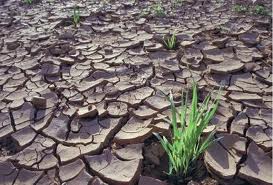West African policy makers should prepare for future challenges from climate change as they address the pressing needs of broad-based economic growth. Maize, millet, rice, and sorghum are the major cereal crops in the region, yet yields from these crops are very low compared to the world average and even other regions in Africa. Impacts from a changing climate will challenge production systems already under pressure to produce more to feed a growing population. Existing farming systems, including crops and livestock, are adapted to today’s agroecosystems in the region, but climate change will alter those systems in uncertain ways, affecting livelihoods, especially those of poor farmers.
The new International Food Policy Research Institute (IFPRI) book “West African Agriculture and Climate Change” uses sophisticated modeling and available data to develop future scenarios exploring the range of climate change consequences for agriculture, food security, and resource management and offers recommendations to national governments and regional agencies. It offers, for the first time, country-by-country climate data and analysis for 11 of the countries that make up West Africa: Benin, Burkina Faso, Cote d’Ivoire, Ghana, Guinea, Liberia, Niger, Nigeria, Senegal, Sierra Leon, and Togo.
“This book is greatly needed in the West Africa region. It fills a major gap in the availability of up-to-date scientific information on the vulnerability of the agriculture sector to climate change in countries and in the region,” said Robert Zougmoré, regional program leader, West Africa, CGIAR Research Program on Climate Change, Agriculture and Food Security (CCAFS). “This monograph will help regional and national decision makers and other stakeholders make better-informed decisions.”
The book is collaboration between IFPRI, CCAFS, the West and Central African Council for Agricultural Research and Development (CORAF/WECARD), a regional agricultural research and development organization, and scientists from each of the countries. It will be presented today in Niamey, Niger at the “Regional Workshop to Mainstream Climate Change in the West Africa Agricultural Productivity Programme,”organized by CORAF/WECARD.
“The book’s focus on both individual countries and the region provides a clear framework for developing informed and coherent national and regional policies to help the vulnerable farming community of West Africa become more resilient to the growing challenges of climate change,” said Abdulai Jalloh, manager, Natural Resources Management Programme, CORAF/WECARD.
In addition to country-level analysis and recommendations, the book offers region-wide policy suggestions:
- Current data collection efforts on weather, land use, and water resources in the region are inadequate to make policy decisions. In particular, improved data on weather are crucial to help farmers make decisions now, and to inform long-term policies.
- Policymakers should incorporate climate change considerations into food security policies—such as those related to crop research, infrastructure, and social services— to prepare for a changing climate while meeting the need for increased quantity and quality of food available to consumers.
- Agricultural research and extension agencies should combine efforts at improving yields with those to develop climate-resilient crop varieties. Training farmers about new techniques and technologies to both adapt to and mitigate the effects of climate change is needed.
- Governments should enable farmers to access vital inputs required for improved productivity and production.
“Climate change considerations should be part of all aspects of national and regional planning and decisionmaking,” said Gerald Nelson, IFPRI senior research fellow. “For example, new roads are essential to raise agricultural productivity. When building them today, plan for higher temperatures and more variable rainfall tomorrow. In some places, expanding irrigation makes a lot of sense for productivity and resilience. When building the infrastructure, plan for more extreme rainfall events and longer droughts than are typical today. These are just a few examples of how improved planning today can increase productivity, enhance resilience in the face of climate change, and raise the incomes of poor farmers in West Africa.”
For more information visit: http://www.ifpri.org/pressroom/briefing/coping-climate-change-west-africa.

